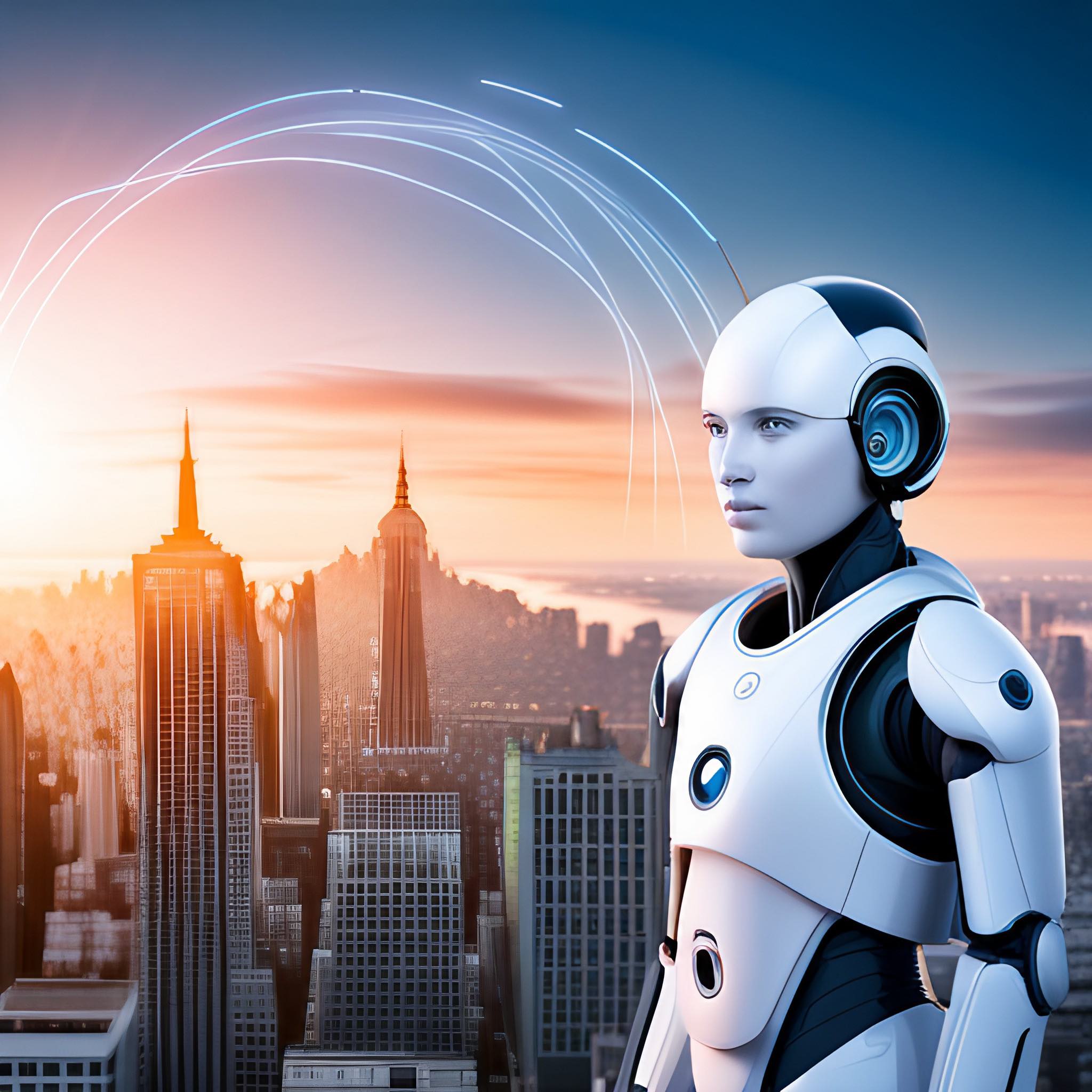Artificial Intelligence (AI) has been raved as the future of technology and humankind. In recent years, AI has made unprecedented progress, transforming various aspects of our lives. It has improved healthcare, finance, education, and transportation, among other areas. However, like any other transformative technology, AI also poses significant risks to humanity. There is growing concern that AI could surpass human intelligence, causing conflict with human goals and values. Misuse and intentional abuse of AI can result in catastrophic consequences. Biased algorithms can perpetuate discrimination, while the loss of jobs due to automation can undermine economic stability. In this blog post, we explore the potential benefits and dangers of AI and what men need to know about this crucial subject.
Dangers and Benefits of Artificial Intelligence: Unleashing the Potential and Perils
Superintelligent AI
One of the major concerns about AI is that it could surpass human intelligence and result in unfavorable outcomes, including the appearance of autonomous machines that could cause harm to humankind. This is known as superintelligence and refers to an AI system that surpasses human intellect and knowledge. There are concerns that superintelligence could be programmed with different goals than human values, which could lead to unintended and dangerous consequences. This means that AI must be designed and developed with clear guidelines and ethical considerations to prevent the emergence of unintended consequences.
Advanced AI has significant potential to enable significant innovations across many fields. One key area in which AI could revolutionize our lives is healthcare – using AI to develop better diagnostics algorithms could improve accuracy and reduce the time and resources spent on treatment and diagnoses. AI could also facilitate personalized drug development by tracking individual patient data. Other areas in which AI could make an impact are transportation – self-driving cars, and logistics – optimizing delivery routes reduces transportation costs and saves time. Additionally, AI can automate many tedious tasks that would allow us to devote time to more creative and innovative work.
As AI is becoming more advanced, it poses significant risks and challenges as well. One critical concern is job displacement – AI and other automation could replace some jobs and cause significant economic disruption. Additionally, if AI is left unchecked, it could potentially lead to accidents, damage, and widescale errors. Additionally, as AI starts to interact with humans, there are risks associated with bias in decision making, lack of privacy, and potentially even super intelligence.
AI also brings to the forefront ethical and social concerns. With the rise of AI, the accountability of autonomous systems is challenging. If a self-driving car is the cause of a fatal accident, who is held accountable? Society needs to establish ethical guidelines for AI systems, including transparency and explainability, to enable the accountability of autonomous systems. In addition, AI’s influence on social media platforms is significant- its impact on democracy, privacy, equality, and safety needs to be taken into account and addressed.
Exploring the Dark Side of Artificial Intelligence: Ethical Concerns and Unintended Consequences
Misuse and Abuse
AI can be used for various purposes, both noble and sinister. Criminals and malicious actors can exploit AI for cyber-attacks and other crimes. Autonomous weapons fueled by AI could result in deadly warfare and chaos. In this regard, AI has the potential to cause far greater damages than other technology. It is therefore crucial for the development of AI to be monitored under strict regulation, with accountability. Additionally, ethical guidelines should be followed, ensuring that the underlying motivation behind their creation is for the betterment of humanity rather than destruction.
Advanced AI has significant potential to enable significant innovations across many fields. One key area in which AI could revolutionize our lives is healthcare – using AI to develop better diagnostics algorithms could improve accuracy and reduce the time and resources spent on treatment and diagnoses. AI could also facilitate personalized drug development by tracking individual patient data. Other areas in which AI could make an impact are transportation – self-driving cars, and logistics – optimizing delivery routes reduces transportation costs and saves time. Additionally, AI can automate many tedious tasks that would allow us to devote time to more creative and innovative work.
As AI is becoming more advanced, it poses significant risks and challenges as well. One critical concern is job displacement – AI and other automation could replace some jobs and cause significant economic disruption. Additionally, if AI is left unchecked, it could potentially lead to accidents, damage, and widescale errors. Additionally, as AI starts to interact with humans, there are risks associated with bias in decision making, lack of privacy, and potentially even super intelligence.
AI also brings to the forefront ethical and social concerns. With the rise of AI, the accountability of autonomous systems is challenging. If a self-driving car is the cause of a fatal accident, who is held accountable? Society needs to establish ethical guidelines for AI systems, including transparency and explainability, to enable the accountability of autonomous systems. In addition, AI’s influence on social media platforms is significant- its impact on democracy, privacy, equality, and safety needs to be taken into account and addressed.

Dangers and Benefits of Artificial Intelligence: Artificial Intelligence (AI) has rapidly emerged as a transformative technology with the potential to revolutionize various aspects of our lives. From healthcare to transportation, AI has showcased its ability to improve efficiency and enhance our daily experiences. However, alongside its promising advancements, there are significant risks that need to be addressed.
Unveiling the Hidden Biases: Examining Discrimination in AI Algorithm
Dangers and Benefits of Artificial Intelligence: Bias and Discrimination
The algorithms that drive AI systems are developed using a vast amount of data. However, if the data used to train the algorithms are biased, then the system will be as well. Biased systems may discriminate against certain groups of people, leading to exclusion and marginalization. Identifying and removing biases from data used to build AI systems is therefore critical. Developers, in addition to regulators, must ensure that AI is as inclusive as possible.
Advanced AI has significant potential to enable significant innovations across many fields. One key area in which AI could revolutionize our lives is healthcare – using AI to develop better diagnostics algorithms could improve accuracy and reduce the time and resources spent on treatment and diagnoses. AI could also facilitate personalized drug development by tracking individual patient data. Other areas in which AI could make an impact are transportation – self-driving cars, and logistics – optimizing delivery routes reduces transportation costs and saves time. Additionally, AI can automate many tedious tasks that would allow us to devote time to more creative and innovative work.
As AI is becoming more advanced, it poses significant risks and challenges as well. One critical concern is job displacement – AI and other automation could replace some jobs and cause significant economic disruption. Additionally, if AI is left unchecked, it could potentially lead to accidents, damage, and widescale errors. Additionally, as AI starts to interact with humans, there are risks associated with bias in decision making, lack of privacy, and potentially even super intelligence.
AI also brings to the forefront ethical and social concerns. With the rise of AI, the accountability of autonomous systems is challenging. If a self-driving car is the cause of a fatal accident, who is held accountable? Society needs to establish ethical guidelines for AI systems, including transparency and explainability, to enable the accountability of autonomous systems. In addition, AI’s influence on social media platforms is significant- its impact on democracy, privacy, equality, and safety needs to be taken into account and addressed.
Adapting to Change: Navigating the Impacts of Job Displacement in the Age of AI
Dangers and Benefits of Artificial Intelligence: Job Displacement
AI often evokes concerns about job displacement, as the technology reduces the need for human intervention significantly. Automated factories, driverless cars, and other technologies may render many traditional professions obsolete. This can have a destabilizing effect on economies, leading to increased inequality, joblessness, and social unrest. Instead of using AI to replace human jobs, it can instead enhance human capabilities and create new opportunities where traditional means of work have become obsolete.
Guarding the Gates: Unveiling the Risks and Solutions to Security Vulnerabilities in AI Systems
Dangers and Benefits of Artificial Intelligence: Security Vulnerabilities
Adversarial attacks on AI systems are a growing concern, as such attacks can cause significant harm, including property damage, physical injury, death, financial loss, and loss of reputation. Therefore, AI developers must invest significantly in developing systems resistant to cyber-attacks, addressing vulnerabilities, and monitoring for any possible breaches.
AI is an incredible technology with the potential to revolutionize the world we live in. However, AI can also pose significant risks, the dangers of which we must take seriously. It is crucial to strike the right balance between harnessing AI’s potential and safeguarding humanity from adverse consequences. Therefore, ethical guidelines, transparency, and accountability must guide the development of AI. Additionally, interdisciplinary research to promote AI safety should be encouraged, and regulatory frameworks should be put in place only if they align with the intention of minimizing harm. Ultimately, men must engage in rigorous conversations about this subject to ensure that AI is designed for the benefit of humanity.







